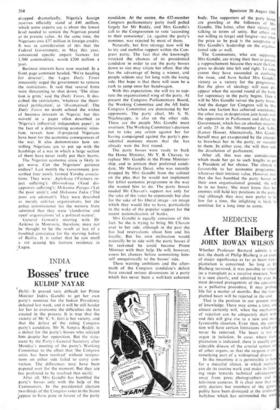INDIA
Bosses' truce
KULDIP NAYAR
Delhi—It proved very difficult for Prime Minister Indira Gandhi to get her own party's nominee for the Indian Presidency defeated last week, and it will be still harder for her to overcome the difficulties she has created in the process. It is true that the victory of Mr V. V. Gin i is her victory, and that the defeat of the ruling Congress party's candidate, Mr N. Sanjiva Reddy, is a defeat for the party's bosses who selected him despite her opposition. But the state- ment by the Party's General Secretary after Monday's meeting of the party's Working Committee to the effect that 'the Congress crisis has been resolved' without resigna- tions on either side failed to carry con- viction. The differences may have been papered over for the moment. But they are too profound to be resolved that easily.
After all, Mrs Gandhi has humbled the .party's bosses only with the help of the Communists. In the presidential election two-thirds of the Congress votes in the States ;appear to have gone in favour of the party candidate. At the centre, the 432-member Congress parliamentary party itself polled largely for Mr Reddy, and Mrs Gandhi's call to the Congressmen to vote 'according to their conscience', i.e. against the party's nominee, was rejected by most of them.
Naturally, her first strategy now will be to try and mobilise support within the Con- gress party. The fact that she knowingly wrecked the chances of its presidential candidate in order to cut the party bosses down to size may vitiate her effort. But she has the advantage of being a winner, and people seldom stay for long with the losing side. Her hope is that there will soon be a rush to jump onto her bandwagon.
With this expectation, she will try to cap- ture the organisational wing of the party. At present the Congress Parliamentary Board, the Working Committee and the All India Congress Committee are dominated by her opponents. The party chief, Mr S. N. Nijalingappa, is also on the other side. These are the people Mrs Gandhi must overturn. The Working Committee's decision not to take any action against her for having campaigned against the party's pre- sidential nominee means that she has already won the first round.
The party bosses were ready to back the Home Minister, Mr Y. B. Chavan, to replace Mrs Gandhi in the Prime Minister- ship, and to jettison their preferred candi- date, Mr Morarji Desai, who was recently dropped by Mrs Gandhi from the cabinet on the plea that he would not implement her leftist economic programme in the way she wanted him to do. The party bosses needed Mr Chavan's support not only for the sake of the votes he commands but also for the sake of his liberal image—an image which they would like to have, particularly in the wake of the popular support for the recent nationalisation of banks.
Mrs Gandhi is equally conscious of this fact. So she is trying to bring Mr Chavan over to her side, although in the past she has had reservations about him and his loyalty. But his own inclination would naturally be to side with the party bosses if he reckoned he could become Prime Minister with their help. He will, however, assess his chances before committing him- self unequivocally to the bosses' side.
These warring ambitions and the after- math of the Congress candidate's defeat have created serious dissensions in a party which has never been a well-knit coherent
body. The supporters of the party bosses are growling at the followers of Mrs Gandhi. The latter, after their victory, are talking in terms of unity. But others are not willing to forget and forgive—not when the price to be paid is the acceptance of Mrs Gandhi's leadership on the organisa- tional side as well.
The Communists, who are supporting Mrs Gandhi, are trying their best to prevent a rapprochement because they want the Con- gress to divide into left and right. To some extent they have succeeded in confusing the issue, and have hailed Mrs Gandhi's victory as a victory for the progressises. But the gloss of ideology will soon dis- appear when the second round of the battle for supremacy in the party begins. Then it will be Mrs Gandhi versus the party bosses. And the danger for Congress will be that when one faction has achieved ascendancy, the other may in desperation join hands uith the opposition in Parliament and defeat the Government, which has an absolute majority of only 25 in the 500-member Lok Sabha (Lower House). Alternatively, Mrs Gandhi herself may get exasperated by the attempts to browbeat her in the party, or succumb to them. In either case, she will then seek the dissolution of parliament.
After all, this was one consideration which made her go to such lengths to get a President of her choice. The climate is favourable to her economic programmes, whatever their intrinsic value. However, now that she has humbled the party bosses on their own organisational ground, she will be in no hurry. She must know that her enemies still hold key positions in the part!. and although they may now prefer to lie low for a time, the infighting is likely to continue for a long time to come.


































 Previous page
Previous page